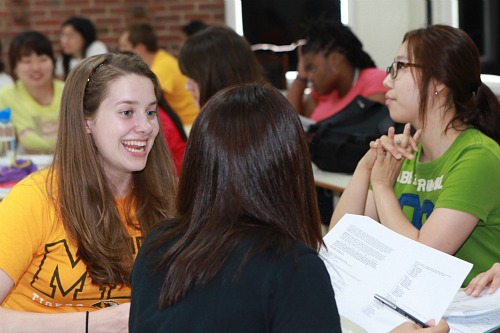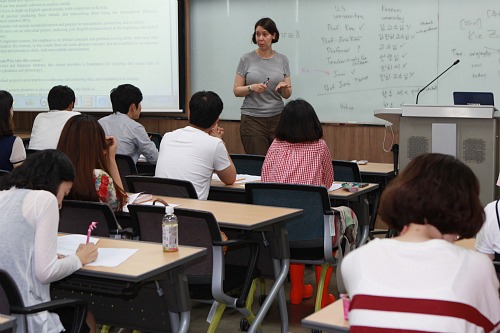<#311 News Focus>
CNU ISS Needs to Be Differentiated
from Other Universities’
By Rigoberto Banta Jr., Tribune Reporter
This year serves as Chonnam National University (CNU)'s third year of providing the International Summer Session (ISS). The ISS is a program where CNU students and international students come together to promote exchange and multicultural understanding through various activities. From 2009 it has operated two sessions—one from the last week of June to mid-July open for all international students and one in August mainly for the Japanese counterparts of CNU. While there are two ISS sessions at CNU, the first mostly provides a margin of internationalization to CNU than the second one, but nonetheless both serve the purposes of cultural understanding amongst CNU students and foreign students alike.

On a macro-level, the ISS is a very strategic and comprehensive 4-week program that allows a win-win situation for all parties involved. Intensive classes from various fields are developed by highly-qualified educators from CNU and foreign universities are held throughout the week while Wednesdays and Saturdays provide ample time for cultural tours for foreign participants. The 2011 ISS, through the extensive efforts of the Office of International Affairs (OIA), has reached a very significant number of foreign professors and students participating compared to the last two years. Kang Shin-hye, the coordinator of the 2011 ISS explained that this is the effect of the promotion executed by representatives of OIA throughout the year. Kang notes that while CNU sends its students to foreign universities abroad, the action is not reciprocal. "There is a need to observe exchange balance between the universities that CNU has ties with, and the ISS is one way to sustain the balance." The 2010 ISS had 10 foreign professors and 14 foreign students, a small number compared to this year's program that had 17 foreign professors and 42 foreign students in participation. This is a big leap from the start-off back in 2009 with only 4 foreign professors and 11 foreign students in participation.
Korean students do not only have the chance to attend the classes held by foreign professors but can interact with foreign students in programs such as the Buddy-Buddy Program. Kevin Mark Gomez, an exchange student from the University of the Philippines-Diliman, CNU's major partner university in the Philippines, exclaimed these comments about the ISS. "We were very much assisted throughout the program. The balance between the classes and the cultural tours brought forth a very healthy balance of learning inside the classroom and outside of it."

This year's program boosted its effectiveness with the help of the Gwangju International Center (GIC), which was in charge of the cultural tours and technical matters, a trend that started from last year. The outsourcing of OIA for this program is one of the major reasons the ISS is such a big success. The ability of CNU working together with different local partners promises a local society fit for the international stage, one of the visions of CNU for the future. As GIC provided improved services this year, OIA sees a longer partnership in the years to come.
The OIA is planning to double the number of foreign students in the ISS next year. The plan of sending representatives from CNU to promote the ISS is still underway with great consideration to visit European universities. The OIA hopes that the foreign faculty invited in the 2011 ISS serving as ambassadors for next year's ISS in their respective universities will be the best strategy to increase the number of participants next year. How about domestic participants? While the number of domestic participants to the ISS from CNU and other universities has been steadily increasing from a small number of 297 in 2009 to 453 in 2011, there has been no change in the manner of promotion of the event to domestic students which includes Korean participants and foreign students who study in Korean universities. Contrary to the popularity attracted by the ISS however, the gains of the ISS are not felt by the students, resulting to the apparent detachment of non-participants to the event itself. Kim Hwa-seung (sophomore, School of Business Administration) says that Korean students see that there are other similar programs that can be a substitute to the ISS. "Students usually join this program to increase their competence, but some students just see another way to build up their resume." The ISS should target local students as well while promoting to foreign students abroad.
Shin Gyeong-gu, Dean of the OIA, foresees having specialized sessions in the ISS. He comments that there is a need to create subject focuses such as Language Education and East Asian Business amongst others following the model of the Eco-Architecture class offered in the ISS. This will enable the ISS to have a specific identity known to be strong for specific fields. This will also help to increase the prominence of ISS amongst summer schools in South Korea.
While the ISS is a testing ground for CNU's capabilities of running an international event and it’s readiness to multiculturalism, it is still very vulnerable for intercultural understanding. The effects of the program might be great to an extent but the question is for how long will it last? The CNU community should all join together to provide a better program in the future.
제이 반타 기자
rj.banta@yahoo.com.ph

